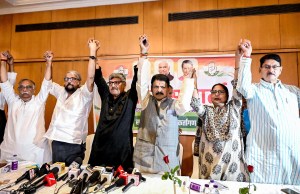
Last year, the BJP government in Karnataka constituted a textbook revision committee after Hindu groups and political outfits alleged that textbooks currently in circulation in the state contained offensive content on Brahmins, glorified Tipu Sultan, played down Mysore Wadiyar’s contributions, among others. While the government claimed that the revision was to correct alleged distortions to textbooks that had been carried out under a previous committee headed by writer Baragur Ramachandrappa during the Congress government headed by Siddaramaiah, the Opposition has accused the government of pushing a right-wing, conservative, pro-Hindutva ideology. Among the objections they raised was to the inclusion of a chapter in the Kannada textbook on RSS founder K B Hedgewar. Besides, works of right-wing ideologues such as Chakravarti Sulibele, Govinda Pai and Bannanje Govindacharya, among others, have been included while chapters on social reformer Narayana Guru, freedom fighter Bhagat Singh, and works of progressive writers such as Sara Aboobacker and P Lankesh have been dropped. The critics felt the committee led by Chakrathirtha had ‘saffronised’ the textbooks with very little representation of writers from other communities.
Who is Rohith Chakrathirtha?
Chakrathirtha was the chairman of the textbook revision committee that was tasked with revising Kannada and social science textbooks of Class 10. Hailing from the coastal region of Udupi, Chakrathirtha is an author and a mathematics teacher. Amid the recent controversy, Chakrathirtha was also criticised for his earlier social media posts. In 2017, he was booked for sharing on Facebook post a parodied version of the state anthem penned by Kuvempu. Many of his earlier tweets on porn had also resurfaced online, prompting writers, authors and Opposition parties to call for initiating action against him.
What were the accusations leveled against the Chakrathirtha-led committee?
Story continues below this ad
As soon as the online version of the Class 10 Kannada and social science textbooks were uploaded on the website of the Karnataka Textbook Society, writers and authors pointed out that the chapter on Bhagat Singh, and writings by Sara Aboobacker and P Lankesh were missing. Instead, the textbooks reprinted a speech by RSS founder KB Hedgewar.
Objections were also raised over omissions and commissions in chapters relating to religious icons such as Basavanna, the founding saint of the Lingayat community who form nearly 17 per cent of the state population, and personalities such as Dr Babasaheb Ambedkar, the architect of the Constitution of India.
There were also allegations that by ignoring the works of Kayyar Kinhanna Rai and Narayana Guru, the sentiments of the Bunts and the Billava community of Dakshina Kannada had been hurt.
The committee was also accused of removing chapters on Bhakti and Sufi saints and neglecting the humanitarian values of Swami Vivekananda. Moreover, critics also alleged that in the Class 6 Kannada textbook, an image of Goddess Bhuvaneshwari holding the Kannada state flag had been replaced with an image of the Goddess holding a saffron flag.
What action did the government take?
Story continues below this ad
Following widespread criticism, Chief Minister Basavaraj Bommai dissolved the textbook revision committee and assured that changes would be made after seeking a report from Education Minister B C Nagesh.
Nagesh later clarified that the revised textbooks would not be withdrawn, though the department was ready to make changes to the controversial and allegedly objectionable content flagged by many writers and critics. The minister clarified that lessons on Bhagat Singh have not been dropped and that the lesson on Narayana Guru has merely been moved from the history textbook to Kannada textbook for Class 10.
The government has ordered a total of eight changes in the Kannada language textbooks for Classes 1 to 10 and social science textbooks for Classes 6 to 10. Among these eight changes, the department clarified that the phrase ‘Ambedkar was the architect of the Constitution’ would be added to the Class 9 textbook and that the deleted portions on the Bhakti sect and Sufi saints will would be restored in the Class 7 social science textbook. The government also said that portions about social reformer Basavanna in the Class 9 social science textbook would be changed but did not clarify what the changes would be.
The Education Department, however, clarified that the chapter on the Mysore maharajas would stay and that the chapter on Tipu Sultan, which earlier stretched across six pages, will stay in its truncated one-page form.
Story continues below this ad
The government said these corrections would be printed separately in a booklet and sent to all schools across the state by the Karnataka Textbook Society over the next 10-15 days.

































